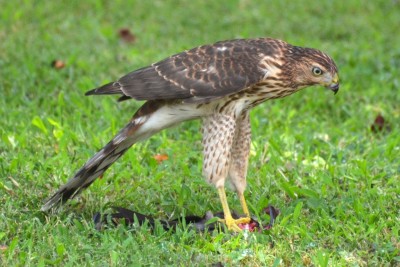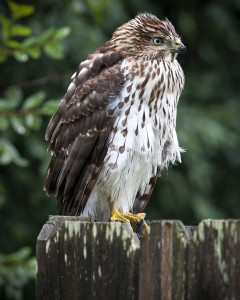

Catching sight of a Cooper’s Hawk is usually just a matter of being attentive. Until a few decades ago, they were considered relatively rare in urban and suburban areas. Today, Cooper’s Hawks are notorious for stalking bird feeders where they can pick off unsuspecting birds for an easy meal. Some studies show that their numbers are actually higher in cities and towns than in forests. Scientist have yet to identify exactly what has caused this shift and why these raptors have adapted better to urban areas than some of their counterparts. It may be related to the increased availability of European Starlings, Rock Pigeons, Mourning Doves, and other medium sized birds, which are easy and abundant prey for the agile Cooper’s Hawk.
This shift in environment, however, has come with its own set of challenges and risks. Cooper’s Hawks have a dangerous style of hunting. They use stealth and speed to sneak up on their prey, and once in range, pursue with a great burst of speed, often weaving deftly through tree branches and other obstacles while keeping their eyes trained on their quarry. At these speeds, if part of their body accidentally collides with a branch, building, or other obstacle in their path, they can be seriously injured or even killed.

City life has added a new and somewhat unpredictable threat: cars. Cooper’s Hawks often hunt by roads and thoroughfares where they can easily spot and snatch something flying across the road. While on the hunt, a Cooper’s Hawk may begin a pursuit that takes it directly into the path of oncoming traffic. With the signature front-facing eyes of a predator, the bird may not catch the motion of the car in its periphery, and even if it does, there is little it can do to avoid it.
This phenomenon is not unique to Cooper’s Hawks. Collisions with vehicles are one of the main reasons raptors end up in a rehabilitators care, particularly during the winter when food is scarce and there are many young inexperienced raptors on the hunt.
Although we cannot always confirm the exact circumstances of an animal’s injury, we suspect that many of the raptors in our care have been hit by cars. The severity of their injuries varies, but fractures and head injuries are typical reasons for admittance.
Birds with presumed head injuries are given anti-inflammatory medicine, put in a dark quiet place, and observed for neurological signs of brain injury. After they are stabilized, birds with body or wing fractures are usually taken to a raptor specialist for flight testing and, if needed, flight conditioning. The duration of a bird’s stay depends on the severity of its injuries. Once it has recuperated, the bird is returned to us so we can release it in its own territory, and hopefully, back to its family.


Love the Hawks, thank you for your services